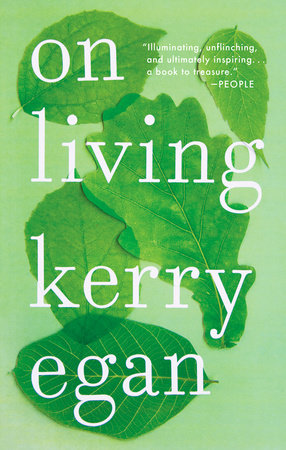On Living
by Kerry Egan
–Review by Teri Hyrkas
Kerry Egan, author of On Living (10/2016, Riverhead Books), is a hospice chaplain — a profession that, in Egan’s experience, has been difficult to explain to family and friends, and seems not to be understood or appreciated by most people, including some of her own patients. Egan’s book contains numerous stories of her patients’ end-of-life experiences, but On Living is not a book about how to die well. Rather, it is a rich blending of narratives from Egan’s hospice patients’ lives, the author’s own experience as a young mother afflicted with a devastating, anesthesia-induced psychosis, and reflections on the gracious truths that can come from “loss and tragedy and trauma.”
Egan, a graduate of Harvard Divinity School, wrote On Living in response to a hospice patient named Gloria. Gloria told Egan that in her youth she thought that getting old caused one to become wise. “But here I am , fixin’ to die, and I never did.” Gloria continued, telling Egan that she always wished she would meet a writer and he could write out her stories so other people could hear them and not make the same mistakes she had. When Egan reluctantly admitted to Gloria that she was a published author, Gloria “threw up her hands and looked at the ceiling. ‘All this time I’ve been waiting for a man, Jesus!… I thought you’d be man, Kerry! But this is it!’ she yelled….’the Holy Spirit sent you to me, and I’ve already told you all my stories. Now you’ve just got to write them down. Maybe someone else can get wise from them. Promise me you’ll tell my stories.’ “
In the writing of her patients’ stories, Egan, a Catholic whose practice is not limited to Catholics only, clarifies the role a hospice chaplain takes with patients. She says, “[Hospice chaplains] are sort of the opposite of storytellers. We’re story holders…. Everyone who does not die young will go through some sort of spiritual crisis, where we have lost our sense of what is right and wrong, possible and impossible, real and not real. Never underestimate how frightening, angering, confusing, devastating it is to be in that place. Making meaning of what is meaningless is hard work. Soul-searching is painful. This process of making or finding meaning at the end of life is what the chaplain facilitates.”
One unforgettable section of On Living is called “Jeremiah.” This is the story of a powerful and accomplished man who, due to a massive stroke, was reduced to a grotesque, speechless, angry, wheelchair-bound nursing home patient. Egan made plans to see this patient but was warned of the man’s rages by the nursing staff. She decided to phone the patient’s wife first to obtain some information before her visit. During the conversation, Egan listened to the wife’s emotional description of her beloved husband who had managed his own law practice for decades, enjoyed playing piano and was a good father; he also loved the Bible. Would Kerry please visit him and read him some verses of scripture? Kerry assured her she would.
After entering his room and reading a Psalm to her patient – who did not acknowledge Egan or react to the scripture at all – the man began to stretch out his arm toward the Bible; he shook his arm around, all the while grunting and staring at the book. Egan handed the Bible to him. Her patient then tried to manipulate the volume, swiping at pages and tearing chunks away. He stopped his pawing in the book of Jeremiah. Kerry worried about her patient’s violent movements and his scripture choice — the book of Jeremiah contains many strong rebukes and unhappy warnings of God’s judgment. Egan writes: “So when my patient landed in Jeremiah, forcefully handed me the open Bible, grunted and nodded, I had a flash of panic. Should I read it aloud, no matter what it said?…
“I looked down at the torn and mangled Bible now in my lap…I read the lines out loud.
” ‘I have loved you with an everlasting love;
I have drawn you with unfailing kindness.’
“Tears began to roll down his cheek, but he was quiet. I was relieved.”
Surprisingly, the remainder of the chapter doesn’t contain the success story that seems to be predicted by Kerry’s initial interaction with her patient. And this is part of the appeal of On Living: Egan is guileless in her descriptions of the relationships she develops with her hospice patients. She makes it clear, often with humor, that those who are dying and those who care for them are far from perfect — angels they are not. Despite this, the stories in On Living seem suffused with supernatural grace.
Moreover, Egan’s account of her personal struggle with a long and severe psychotic break adds an intimate, complex dimension to her book. Her difficult experience gives weight to her observations and interactions with her patients. She writes, “I don’t know if listening to other people’s life stories as they die can make you wise, but I do know that it can heal your soul. I know this because those stories healed mine.”
In On Living, hospice chaplain Kerry Egan provides a glimpse into a mysterious world — the liminal space where life and death meet. Deeply moving, On Living is a superb read; it is also especially fitting for the last days of Lent, when our thoughts turn to the passion and death of Jesus.

